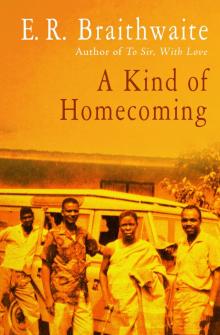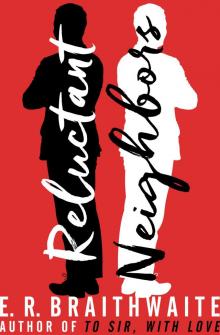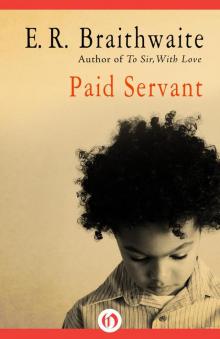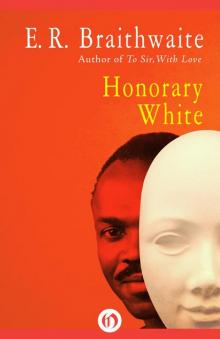- Home
- E. R. Braithwaite
Honorary White
Honorary White Read online
Honorary
White
E. R. Braithwaite
Contents
Chapter One
Chapter Two
Chapter Three
Chapter Four
Chapter Five
Chapter Six
Chapter Seven
Chapter Eight
Chapter Nine
Chapter Ten
Chapter Eleven
Chapter Twelve
About the Author
Chapter
One
MY VISIT TO SOUTH Africa really began the moment the huge Boeing 747 lifted off the tarmac at London’s Heathrow airport and shuddered its way into the darkening sky. From that moment, my section of the lower rear cabin was transformed into a separate little world peopled by an impromptu, noisy mix of British, Americans, Swiss, Germans, South Africans, a few French, and me.
I sat watching and listening, especially to the emigrants. They were all British, suspended between the certainty of having finally discarded a familiar way of life and the uncertainties toward which they were being inexorably propelled. They were all young, aged between eighteen and thirty, and seemingly ill at ease as they recited the litany of troubles which had precipitated their decisions to leave Britain—the skyrocketing cost of living, restrictions on heating, lighting, and gasoline, the excessive cost of mortgages, strikes, competition with Blacks for jobs, and the inclement weather.
“We’re doing it mainly for the children” was the excuse most frequently exchanged between them. I wondered why they found it necessary to make excuses for the decision to make a change, especially one so exciting and adventurous. The children, for their part, were soon running up and down the aisles and in and out of the toilets, happily unaware of the role they played in their parents’ momentous decision.
At Nairobi, our first stop on African soil, some of the passengers departed and were replaced by British and South Africans linking up with us from other routes. All white. Not another black face in sight.
The other travelers had something else in common. They were all, in varying degrees, pleased and excited to be going or returning to South Africa. I was odd man out, wrapped in layers of uncertainty and apprehension, wondering whether and for how long I would be able to stay in an environment which would deliberately seek to humiliate and degrade me.
My fellow travelers knew the good life or anticipated a better one. Would any of them be able to understand my decision to expose myself voluntarily to a social order which would not only deny my humanity, but claim divine guidance and support for doing so? Ever since leaving the London airport, I had not exchanged a single word with anyone but the stewards, and then only in response to queries about meals. Was this a foretaste of what lay ahead?
Since boyhood in Guyana I had heard stories about horrors of life for Blacks in the gold, diamond, and coal mines of South Africa, and the cruel oppression they suffered at the hands of their European conquerors. I remember hearing about Blacks working deep in the bowels of the earth, day after day, ill-fed and poorly paid, completely at the mercy of the Whites who tyrannized and bullied them. Floods and cave-ins had trapped hundreds of these Blacks, and only token rescue efforts were made; their fate was of little consequence because they could so easily be replaced.
We talked of these things, my boyhood friends and I, happily ignorant of the grimmer realities, safe in our freedom to move and speak, to see and learn, our discussions of the plight of our faraway black brethren hardly more than an academic exercise. In Guyana, the men who worked the gold, diamond, and bauxite deposits were called miners, but they all worked above ground, not like moles burrowing deep out of sight. The gold and diamond miners usually worked their own “claims,” each hoping for the one big “strike” which would lift him overnight from penury to riches, meanwhile scratching a bare living from the reluctant earth. The bauxite miners worked for the Bauxite Company, balancing precariously between negotiations for better conditions and threats of a strike.
It was hard for my friends and me to take in the horror stories of long lines of ragged black men led docilely to and from the deep pits each day, under the cruelly watchful eyes of armed white guards. Why did they not turn on their oppressors the same way the Guyana sugar plantation workers sometimes did when the burden of long laborious hours with poor pay became unbearable? Blissfully young and arrogantly uninformed, we blamed the South African Blacks for being too timid and boasted among ourselves of what we would have done in similar circumstances.
As I grew up, it seemed that each successive South African Government instituted new and more oppressive laws against the black population, who seemed more and more resigned to their fate, or more and more helpless to change it. I met African Blacks for the first time during my student days in England. Though none of them was from South Africa they seemed well informed about life in the Republic and excited my imagination with horror tales of white-settler inhumanity to the native Blacks. As they told it, the whole sorry business began with the establishment of a Dutch East India Company Trading Station at Table Bay and some mutinous personnel who later settled there as free farmers. Slaves from other parts of Africa were shipped there to help in the development of the settlement but were rigidly segregated, being denied even the right to wear shoes. As the settlement developed, the settlers or trekboers pushed into the interior, seizing the wide grazing grounds of the pastoral Hottentots, stealing their cattle, and killing the virtually defenseless Blacks.
“Those trekboers were all Calvinists and believed that God made the white man to rule over Blacks,” one friend reminded me. “In fact they conceived of Blacks as being little more than animals. They would hold shooting competitions, with prizes going to the men who, in a stipulated time, killed the largest number of Blacks. Proof of a ‘kill’ was the severed penis of a male or two breasts of a female. Nothing new. The British did the same thing when they colonized Australia and Tasmania.
“Nothing has changed. Nothing,” he said. “Sure, Blacks in South Africa wear shoes nowadays and are not arrested for smoking in the street. They’re even allowed to work in offices or on building sites beside white men. But that means nothing. Whites still think the Blacks are animals. True, they’re not shot for bounty like in the old days. Nowadays Blacks who step out of line are quickly arrested. The lucky ones are sent to jail; the others simply disappear.”
“For what crime?” I asked. My friend evidently had a flair for dramatic overstatement.
“Crime? If you’re black in South Africa that’s the crime. Everything else is merely supporting evidence. To look a white man in the eye is a crime. To object when he abuses you is a crime. Everything you do is a crime. The State says so and the Church agrees.”
When job-hunting in London in the summer of 1947, I met a black escapee from South Africa. At that time I was in the throes of despondency and disillusionment at the prejudice and discrimination I had encountered in Britain. It was in a coffee shop off Piccadilly Circus where I occasionally had a mug of hot tea and a thick cheese sandwich for my midday meal. Cheap and satisfying. He was there when I arrived and I deliberately took a seat near him. He smiled as I sat down.
“Hello, there,” he greeted me, speaking with difficulty through a mouthful of fish and chips.
I was pleased at the prospect of a friendly interlude with another human being, particularly a black one. We’d understand each other.
“Where you from?” he wanted to know.
“Guyana.”
“Been over here long?”
I mentioned that I’d come over eight years earlier and taken a degree at Cambridge and gone on to post-graduate studies. Then I had served in the R.
A.F. Now I was job-hunting.
“You’ll do all right,” he assured me.
“Like hell I will. I’ve already been hunting nine months for a job. Any job.”
“You’ve not been looking in the right places,” he said. “I’ve been here two years and I’ve got a job. Got it six weeks after I arrived. Good job. No complaints.” Smiling a white-toothed, superior, employed smile.
“Doing what?” I asked.
“Hospital orderly at Lewisham General.”
“You like it there?”
“Sure. The pay’s good. Lots of time off, and the work’s not hard. You should try it.”
“No thanks.” The idea of working in a sterile hospital ward ministering to ailing, irritable people did not appeal to me.
“Then what are you complaining about? You want a job, don’t you?”
“I’m looking for a job I’m qualified to do.”
“Man, you’re lucky you can pick and choose. Where I come from you take what they give you.”
“Where’s that?”
“Cape Town. South Africa. I finished high school, but the only job I could get was messenger boy in a grocery store. Sweep out the store and carry groceries for the Whites. One Rand a week.”
“How much is that in English money?”
“About eighteen shillings.”
“So you decided to come over here,” I said.
“You make it sound so easy, man. As if I walked up to the steamship office and said ‘I’m going to England, here’s the money for my fare.’ Hell, I walked to Port Elizabeth, then stowed away on a British ship for Southampton.”
“Just like that?”
“Oh, they found me when we were halfway across. Made me wash decks and help in the galley. But here I am.”
“And here you stay,” I added.
“Hell, yes. I’d rather die than go back. In South Africa a black man is treated like an animal. Your degrees wouldn’t be worth a damn. Anyway, you couldn’t get into the universities, not the white ones.”
In 1960 I received an appointment as Human Rights Officer for the World Veterans Federation at the Federation’s headquarters in Paris and met many South Africans who lived there, most of them painters, writers, or musicians. They all saw themselves as voluntary refugees from a repressive police state. Sometimes over coffee at an outdoor Left Bank restaurant I’d join in lively discussion with them and a few expatriate Americans, black and white. I learned that, even with lynch law at its worst, life in the southern United States was far better for Blacks than in South Africa. At that time Blacks in the American South had limited voting rights while Blacks in South Africa were not even included in the national census, because they were not considered human. In the United States Blacks could seek redress for injustice in the Federal courts, either directly or through legal representation; in South Africa the courts themselves enforced discriminatory practices. Apart from me, all those who took part in the conversations had firsthand experience of the oppression they described, and the picture they drew of the life of Blacks in South Africa was frightening—a society where the owner of a black skin was helplessly subjected to exploitation, ill-treatment, and the death penalty.
Early in 1965 I was appointed Guyana’s Ambassador to the United Nations and met more South Africans in New York, white and black. Some of the Whites, churchmen and others of liberal persuasion, were petitioners against the racist regime; but the majority were businessmen, employees of the South African Government, and tourists. Always acutely aware of the overwhelming antipathy to their Government, they were continually on the defensive, insisting that outsiders could not appreciate the peculiar conditions of South Africa. Without exception, the South African Blacks I met were petitioners, escapees, and permanent exiles from their country, and committed to persuading United Nations member states to deny any aid or support to South Africa.
In 1966 the United Nations General Assembly voted overwhelmingly to terminate South Africa’s mandate to supervise and control South West Africa, now Namibia, and itself assumed full responsibility for the territory. I was very active in the special committee which designed the resolution and lobbied for its passage until finally the United Nations Council for South West Africa was set up. I was made President of that Council.
I plunged enthusiastically into the struggle to free Namibia from the defacto control of South Africa. But although I then became directly involved with the fate of the Blacks of Southern Africa, my prime interest at the time lay in showing that I was fully professional, so as to demonstrate that representatives from the smallest, least powerful, and poorest of member nations could effectively conduct the business of the United Nations.
Some of the black petitioners were impatient with the careful way in which I approached their complaints. They clearly expected of me a more immediate identification with their situation and were not the least bit impressed by my posture of scrupulous impartiality. During a session with a group of exiles from Namibia one of them impatiently asked,
“Mr. Ambassador, whose side are you on?”
Many a petitioner would say “You ought to go and see for yourself,” as I failed to comprehend the horrors they tried to convey: police brutality; arrest and imprisonment without legal defense; trials which mocked justice; Blacks routinely sentenced to banishment and death; Blacks barred by law from voting; Blacks forbidden to organize labor unions, banned from all but the lowest work categories. It was all new to me. The British who had governed Guyana were no strangers to prejudice and discrimination, but nothing in their treatment of that predominantly black population in any way compared with the terrible stories I heard from the South African petitioners. It was not painful for me to reflect on British Guiana’s civil service, schools, colleges, police, communications, utilities, and courts—all managed and operated by Blacks under white supervision which was more ritual than functional. Then, as now, the busiest places in the country were the courts, forever crowded with litigants and their representatives, as if everyone was determined to prove his access to equal justice.
The Government of South Africa pointedly ignored the new Council. Several requests for permission to visit Namibia were either unanswered or peremptorily refused. On one occasion, I made a personal appeal for a meeting of the U.N. Security Council on behalf of a group of Namibian Blacks who had been abducted within their country by South African Security Police and taken to South Africa where they were charged with treason, tried, and pronounced guilty. The members of the Security Council individually expressed their distaste for South Africa’s action and, in carefully guarded language, condemned her intrusion into the territory over which she no longer had legal control. However, no resolution emerged from the meeting, nor was there any collective statement of condemnation of South Africa. The Blacks were hanged.
“Go and see for yourself,” the petitioners urged, though they knew that the Council and I would not be permitted to enter South Africa or Namibia. And while I sometimes heard myself echoing the same refrain, I knew that I would not willingly have exposed myself to life in South Africa. So I played with the thought of going there, secure in the knowledge that I would not be allowed in. But the thought often haunted me: Just suppose the South African Government suddenly relented?
Just supposing one day there came a letter of clearance for the Council to visit Namibia? My colleagues and I, black and white, would have to go through South Africa. Would we be allowed to travel together, eat together, use the same hotel? Or would we be segregated according to South Africa’s racial policies? Would I accept such segregation as secondary to the main issue of fact-finding? Perhaps, as a native of another sovereign country and under the protection of the United Nations I would not be subject to South Africa’s segregation laws. But, if insulated from them, how could I truly appreciate their effect?
It would be a harsh irony for me, a black man, to visit a c
ountry like Namibia or South Africa and be isolated from the cruelties to which other black men were continually subjected. How would the Blacks themselves react to me, a “protected” person? Would they respond to me as a black “brother” or merely as a representative of the United Nations who happened to be black but was unlikely to be concerned for their plight? I was not an African, had no knowledge of their languages and no real understanding of their traditions, so I would be as much an outsider as anyone else.
Early in 1973, long after I had left the U.N., a friend in Guyana sent me a clipping from the South African Official Gazette. The clipping stated that, as of that date, the ban on all books by E. R. Braithwaite was lifted. I was surprised and, on impulse, telephoned the South African Consul General in New York. I said that I had just learned of the lifting of the ban from my books, and even as I thought of it, asked whether the ban was lifted from the author as well.
The Consul General was friendly and charming and completely and happily unaware of author, books, or ban. We chatted awhile and he suggested that the best way of checking any ban on myself was by applying for a visa. All visa applications are processed in Pretoria and a successful application would mean there was no ban. He invited me to visit his office at my convenience and make the application.
He was as friendly, courteous and urbane as his voice had promised. With the utmost civility we talked about his country and its policies and he said that he sincerely hoped my visa application would be favorably considered and that I might at close quarters come to an appreciation of why such policies and practices were necessary in the prevailing circumstances. I told him that everything I had heard about his country had already prejudiced me against that likelihood.
“Be patient. Go and see for yourself,” he said, unwittingly echoing the others. He sounded as if he expected the visa to be granted. Would he, as Consul General, advise that I be given one? I suddenly felt cornered. Supposing, just supposing the visa was granted. What then? I was not attracted to the idea of spending any time in a racist society. So why bother to apply for a visa? If it was granted and I refused it, that would be the end of me as a critic of South Africa.

 A Kind of Homecoming
A Kind of Homecoming Reluctant Neighbors
Reluctant Neighbors Paid Servant
Paid Servant Billingsly
Billingsly Honorary White
Honorary White To Sir With Love
To Sir With Love Choice of Straws
Choice of Straws